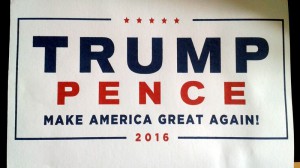Hopes that the new Republican administration might exert any major effort to overthrow the Cuban dictatorship are scarce. The only reasonable thing to expect is even more confrontational rhetoric and actions of little or no help to Cuba in promoting the pro-democratic agenda in the country. And that’s exactly what the old guard of the single-party government most benefits from.

There’s an implicit belief about an external enemy (the readier to fight, the better), especially if it is a superpower within a 90 mile distance whose leading representatives have shown lack of willingness to go beyond the level of political realism. Richard Nixon, Ronald Reagan and the Bushes (father and son) were all Republican presidents who promised, in their respective terms of office, to put an end to the totalitarian regime in the Antilles but achieved quite the opposite.
The model designed by Fidel Castro and his collaborators in 1959 has been thriving on the insults and threats exchanged between the two countries, which the State-controlled media usually greatly exaggerated. In the weeks leading up to November 8, Donald Trump delivered several pre-election speeches in which he reiterated the need to restore the embargo at any cost (yet, for the moment, his words are still pure fiction).
Clearly, the promises to hold the Castro regime back by force are going to fade away with the approach of the day of the presidential oath. There are already signs that the current stances towards Cuban socialism that Raúl Castro is striving to preserve (keeping it at gunpoint and using money transactions) are subject to change.
The winner of the presidential elections that kept half of the world in suspense has already announced that he is able to reach a better agreement with the island’s leaders. Obviously, the list of options put together by the real estate tycoon who is going to govern the United States from January 20, 2017, does not contain the possibility of a military invasion (that many have been hoping for) or weakening of the nation by imposing economic sanctions. Anyway, in good time we are going to learn about the practices and actions that are supposed to help Cubans enjoy every single one of the fundamental freedoms.
On the one hand, past experience has shown that the subject of Cuba is never included in the list of priorities and there’s no reason to think that this time it will be different. On the other hand, Donald Trump is a successful businessman who entered politics to amuse himself. He has dedicated his whole life to business and it’s logical that one of his medium- or long-term objectives will be to promote investments in Cuba. Moreover, Congressional Republicans have already shown their support for such initiatives and it seems far more probable that the support will only grow stronger during the term of the ultraconservative president, instead of weakening. In any case, seeing Donald Trump as a liberator or as the best ally in the struggle against totalitarian dictatorship is an extreme notion, and an absurd one at that.
In a certain way, all American presidents, both Republicans and Democrats, from John F. Kennedy to Barack Obama, did what was within their power. One always needs to be remember that the Cuban issue is but one more in their political agenda and that there are interests of higher importance, which need to be attended to first.
The solution for Cuba must come from within. It’s very likely that the true transformation of the country begins as soon as the current main representatives of the State take their places in a mausoleum. Yet, this theory held by experts from within and outside the island stands in contrast to the events in the former Soviet Union that occurred five or six years before its collapse. Cuba could undergo a more or less peaceful and gradual transition from top to bottom.
The other alternative would be an implosion and chaos caused by the inefficiency of the economic system and corruption. In case of such scenario, Trump would probably have to issue an urgent order to send troops that would restore order. With a bit of luck, they would also bring democracy. Who knows…

Leave a comment